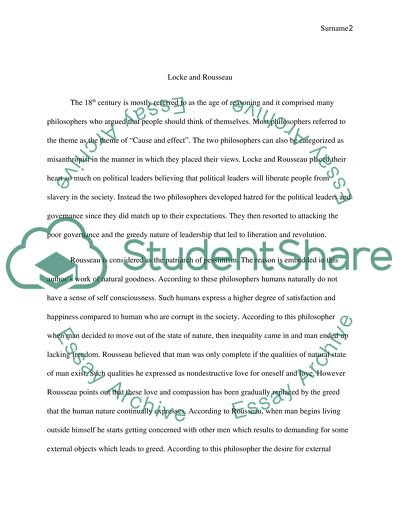Cite this document
(“Locke and Rousseau differ on many points, but arguably both rest their Essay”, n.d.)
Locke and Rousseau differ on many points, but arguably both rest their Essay. Retrieved from https://studentshare.org/miscellaneous/1642060-locke-and-rousseau-differ-on-many-points-but-arguably-both-rest-their-analysis-of-political-life-on-a-pessimistic-or-misanthropic-assessment-of-human-nature-to-what-degree-is-this-true-do-their-arguments-about-mans-nature-differ-in-substance
Locke and Rousseau differ on many points, but arguably both rest their Essay. Retrieved from https://studentshare.org/miscellaneous/1642060-locke-and-rousseau-differ-on-many-points-but-arguably-both-rest-their-analysis-of-political-life-on-a-pessimistic-or-misanthropic-assessment-of-human-nature-to-what-degree-is-this-true-do-their-arguments-about-mans-nature-differ-in-substance
(Locke and Rousseau Differ on Many Points, But Arguably Both Rest Their Essay)
Locke and Rousseau Differ on Many Points, But Arguably Both Rest Their Essay. https://studentshare.org/miscellaneous/1642060-locke-and-rousseau-differ-on-many-points-but-arguably-both-rest-their-analysis-of-political-life-on-a-pessimistic-or-misanthropic-assessment-of-human-nature-to-what-degree-is-this-true-do-their-arguments-about-mans-nature-differ-in-substance.
Locke and Rousseau Differ on Many Points, But Arguably Both Rest Their Essay. https://studentshare.org/miscellaneous/1642060-locke-and-rousseau-differ-on-many-points-but-arguably-both-rest-their-analysis-of-political-life-on-a-pessimistic-or-misanthropic-assessment-of-human-nature-to-what-degree-is-this-true-do-their-arguments-about-mans-nature-differ-in-substance.
“Locke and Rousseau Differ on Many Points, But Arguably Both Rest Their Essay”, n.d. https://studentshare.org/miscellaneous/1642060-locke-and-rousseau-differ-on-many-points-but-arguably-both-rest-their-analysis-of-political-life-on-a-pessimistic-or-misanthropic-assessment-of-human-nature-to-what-degree-is-this-true-do-their-arguments-about-mans-nature-differ-in-substance.


